

Sign Language GIFs. ADHD Parent's Evening. Home - Do-IT Profiler. Booklet for Clinicians. The PDA Society has recently revised our reference booklet for Practitioners.
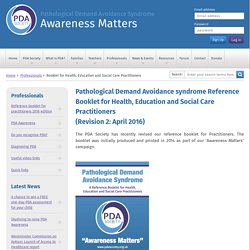
The booklet was initially produced and printed in 2014 as part of our 'Awareness Matters' campaign. The booklet will be useful to Health, Education and Social Care Practitioners. To download an electronic copy of the 2016 revision of our Reference booklet for Practitioners please click here This is a free electronic resource. Distribution is positively encouraged. Important Information regarding printed copies We have a limited supply of hard copies of the 2016 edition of our reference booklet.
If you are a practitioner working in the Health, Education or Social Care field and you would like to request a hard copy, please email tracy.rose@pdasociety.org.uk with your name, job title and full work address including postcode. Parent's Guide To Sensory Integration. BT-Tics Behaviour Therapy for tics and Tourette syndrome. Tics - Therapist Manual & Workbook for Children English edition.
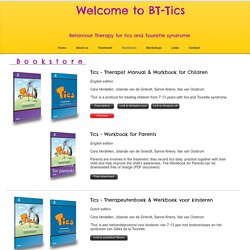
Dyspraxic Me. Sometimes I stutter. Reilly et al 2013 Support for Learning. Thespectrum.pdf. Planning Transition from School. Click the Buy Now button below to purchase and download a printable PDF version of the workbook, or scroll down to learn more about what's inside.
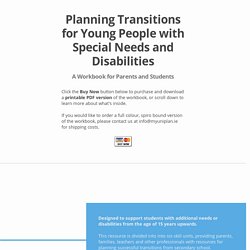
If you would like to order a full colour, spiro bound version of the workbook, please contact us at info@myuniplan.ie for shipping costs. Designed to support students with additional needs or disabilities from the age of 15 years upwards. This resource is divided into into six skill units, providing parents, families, teachers and other professionals with resources for planning successful transitions from secondary school. The workbook helps students to identify strengths, challenges, needs and aspirations, and to turn these into achievable goals, focusing on: Building personal skills Developing learning skills Exploring post-transition options Using human and technological support Learning to be independent Managing the transition bridge Click on the Buy Now button below to purchase and download a printable PDF version of the workbook. PDA Demand Avoidance Strategies. Information Booklet from Dr Emma Gore Langton and Zoe Syson.
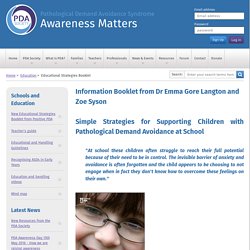
What is dyspraxia? Addressing Dyslexia Toolkit. Holiday Planner for Sensory Processing. The future is bright for dyslexic students at university. It was my need to read pages several times before information sank in that encouraged me to get tested for dyslexia.
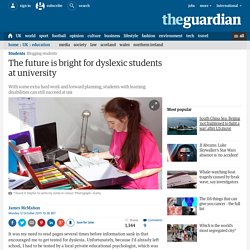
Unfortunately, because I’d already left school, I had to be tested by a local private educational psychologist, which was extremely expensive. After three hours of exercises, which ranged from solving puzzles to simple maths problems, the educational psychologist gave me the diagnosis. At 18, having already completed my A-levels, this was unusual and came as a shock. Seven myths about dyslexia put to rest. As researchers who study dyslexia, we often read articles or overhear conversations that completely misunderstand what dyslexia is – or how it can be treated.
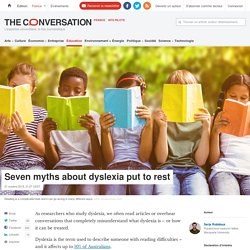
Dyslexia is the term used to describe someone with reading difficulties – and it affects up to 10% of Australians. A reader with dyslexia may have difficulty in reading unusual words like yacht; have difficulty with nonsense words like frop; misread slime as smile; struggle to understand passages; or struggle in a number of other ways when reading. To coincide with Dyslexia Empowerment Week – aimed at raising awareness and understanding of the disorder – we highlight the seven most common misconceptions about dyslexia. Supporting tics and Tourettes in school. By Meir Flancbaum & Jeremy Lichtman Tic disorders are relatively common childhood-onset conditions (Kurlan et al., 2001).
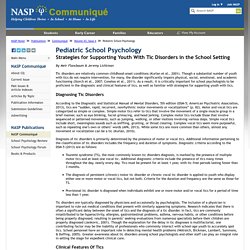
Though a substantial number of youth with tics do not require intervention, for many, the disorder significantly impairs physical, social, emotional, and academic functioning (Storch et al., 2007; Conelea et al., 2011). As a result, it is critically important for school psychologists to be proficient in the diagnostic and clinical features of tics, as well as familiar with strategies for supporting youth with tics.
Diagnosing Tic Disorders According to the Diagnostic and Statistical Manual of Mental Disorders, 5th edition (DSM-5; American Psychiatric Association, 2013), tics are “sudden, rapid, recurrent, nonrhythmic motor movements or vocalizations” (p. 82). Angelman Today. Home » Education » IEP – Individual Education Plan IEP – Individual Education Plan Angelman Today 13 September 2013 Education, September/October 2013 edition Tags: Angelman Today Sept 2013, Education, IEP, Individual Education Plan IEP – Individual Educational Plan.
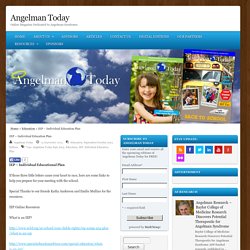
We are Colorblind. Ellen's Blog. OCD and I.
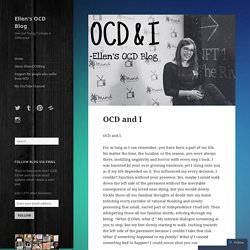
For as long as I can remember, you have been a part of my life. No matter the time, the location or the season, you were always there, instilling negativity and horror with every step I took. Spotlight on Alexia. Once we have successfully learned how to read, it continues to be easy for most of us.
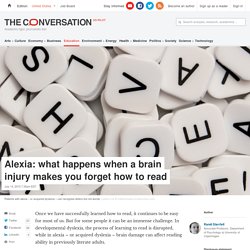
But for some people it can be an immense challenge. In developmental dyslexia, the process of learning to read is disrupted, while in alexia – or acquired dyslexia – brain damage can affect reading ability in previously literate adults. Patients with pure alexia lose the ability to read fluently following injury to areas in the rear part of the left hemisphere of their brain. The curious thing is that they can still walk, talk, think, and even write like they did before their injury. Specific Language Impairment. Inclusive language: words to use and avoid when writing about disability. Consider these guidelines when communicating with or about disabled people. 1. Language guidelines Not everyone will agree on everything but there is general agreement on some basic guidelines. 1.1 Collective terms and labels The word ‘disabled’ is a description not a group of people.
Tourettes Action. What is Obsessive Compulsive Disorder? Print There's more to OCD than constantly washing your hands. When you mention the term OCD the first thing most people think of is someone who needs to repeatedly wash their hands or likes to keep things nice and tidy. Monica from Friends may even come to mind. However, there's far more to Obsessive Compulsive Disorder than you might think. OCD: The Facts Obsessive Compulsive Disorder is a long-term mental health condition that is usually associated with two things: Obsesssive thoughts and compulsive behaviours.Obsessions: An obsession is an unwanted, unpleasant thought, image or urge that repeatedly enters a person's mind.
22q11 Ireland. What is Dyspraxia? Diagnostic checklists. Nursing and Dyslexia. 3rd Level Guide for Students with ADHD.pdf. Information Booklets. Transitional Guidelines for Parents of Students with Special Educational Needs and for Schools The NCSE has published transitional guidelines for parents of students with special educational needs. AHEAD: A guide to Disclosure 2013.pdf. Dyslexia in Children: Essentials Parents Should Know. Up to one in five individuals has dyslexia. This disability cannot be detected until a child starts reading — and thereafter, it can still take several years to arrive at a diagnosis. Here’s how to recognize the symptoms, navigate the diagnostic process, and be the best possible advocate for your child.
Dyslexia. Tips for Teens with DCD. 5 Tips for New College Students with Disabilities. Ahead - Participation Rates Data Centre 2013/14. Epilepsy Ireland. Find a psychologist. NEPS regional contacts. College Disability Services. IT Sligo is located on a 72-acre campus in Sligo. Quality courses, experienced lecturers, a modern campus and vibrant social and sporting scenes are the hallmarks of the student experience here.
IT Sligo offer a wide range of courses in the areas of Science, Engineering, Business and Social Sciences, and is continually enhancing courses to ensure that they equip out students for the challenges and opportunities of the modern workplace. Entry Requirements DARE 2015 Requirements for Higher Certificate / L6 You must achieve a pass in the Leaving Certificate— 5 grade Ds at Ordinary level including English or Irish and Mathematics.We also accept an E in Higher Level Mathematics, and a B2 or higher in Foundation mathematics, as meeting the mathematics entry requirements.
Requirements for Ordinary Degree / L7 As above, and in addition we require a minimum of 140 points for entry to all level 7 programmes. Requirements for Honours Degree / L8. Visiting Teacher Service - Department of Education and Skills. Introduction. For Parents. This section of the website has been designed specifically to meet the information requirements of parents. Home Tuition Information - Department of Education and Skills. Participation rates 2012. Ahead - Home. HADD Ireland - ADHD - Attention Deficit Hyperactivity Disorder - Making life better for people affected by ADHD.
DeafHear. Home. Autism Spectrum Information Advice and Meeting Point. Aspire : Asperger Syndrome Association Of Ireland. Dyslexia Association of Ireland.